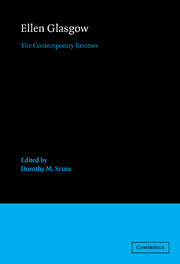Book contents
- Frontmatter
- Contents
- Series Editor's Preface
- Preface
- Acknowledgments
- Introduction
- The Descendant (1897)
- Phases of an Inferior Planet (1898)
- The Voice of the People (1900)
- The Battle-Ground (1902)
- The Freeman and Other Poems (1902)
- The Deliverance (1904)
- The Wheel of Life (1906)
- The Ancient Law (1908)
- The Romance of a Plain Man (1909)
- The Miller of Old Church (1911)
- Virginia (1913)
- Life and Gabriella (1916)
- The Builders (1919)
- One Man in His Time (1922)
- The Shadowy Third and Other Stories (1923)
- Barren Ground (1925)
- The Romantic Comedians (1926)
- They Stooped to Folly (1929)
- The Sheltered Life (1932)
- The Old Dominion Edition of the Works of Ellen Glasgow (1929-33)
- Vein of Iron (1935)
- The Virginia Edition of the Works of Ellen Glasgow (1938)
- In This Our Life (1941)
- A Certain Measure (1943)
- Index
The Descendant (1897)
Published online by Cambridge University Press: 04 May 2010
- Frontmatter
- Contents
- Series Editor's Preface
- Preface
- Acknowledgments
- Introduction
- The Descendant (1897)
- Phases of an Inferior Planet (1898)
- The Voice of the People (1900)
- The Battle-Ground (1902)
- The Freeman and Other Poems (1902)
- The Deliverance (1904)
- The Wheel of Life (1906)
- The Ancient Law (1908)
- The Romance of a Plain Man (1909)
- The Miller of Old Church (1911)
- Virginia (1913)
- Life and Gabriella (1916)
- The Builders (1919)
- One Man in His Time (1922)
- The Shadowy Third and Other Stories (1923)
- Barren Ground (1925)
- The Romantic Comedians (1926)
- They Stooped to Folly (1929)
- The Sheltered Life (1932)
- The Old Dominion Edition of the Works of Ellen Glasgow (1929-33)
- Vein of Iron (1935)
- The Virginia Edition of the Works of Ellen Glasgow (1938)
- In This Our Life (1941)
- A Certain Measure (1943)
- Index
Summary
Outlook, 55 (27 March 1897), 855
From [Harper 6c Brothers] comes The Descendant, an anonymous novel of the strenuous kind which exhibits untrained force. There is passionate intensity in the story of the despised illegitimate boy who becomes a fierce Socialist editor, a misanthrope, and a misogynist; his failure to carry out his theories in his personal life, his imprisonment for manslaughter, and his death in the home of the one woman who has loved him and whom he has illtreated, make a gloomy, painful tale, but one written with considerable power.
Laurence Hutton, “Literary Notes,” Harper's Magazine, 94 (April 1897), 549
A very strong, and a very unusual, piece of fiction is The Descendant, by an author who chooses to remain anonymous. The hero is an Ishmaelite who began life by cursing and hating everybody, from his father, whom he called a villain, to his mother, whom he called a fool. His hand was against every man, and every man's hand was against him. He hurled defiance at law and order, until he was brought to order by the power of the law. As a journalist and a writer upon The Iconoclast, he had much of the power of Ibsen, and all Ibsen's audacity. He left nothing unassailed. He had a genius for upsetting and destroying. His lecture upon “Social Lies” set society ablaze. “Life is an apple,” he cried, when he was twenty-six.
- Type
- Chapter
- Information
- Ellen GlasgowThe Contemporary Reviews, pp. 1 - 14Publisher: Cambridge University PressPrint publication year: 1992



